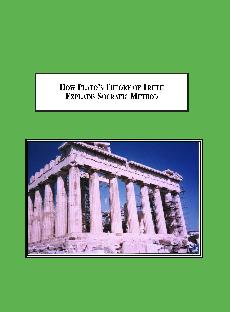How Plato’s Theory of Truth Explains the Socratic Method. Consistency is the Test of Truth
We are currently unable to ship to the EU countries at this time. We apologize for this inconvenience.

| Author: | Jenks, Rod | |
| Year: | 2010 | |
| Pages: | 236 | |
| ISBN: | 0-7734-3701-0 978-0-7734-3701-2 | |
| Price: | $179.95 + shipping | |
| (Click the PayPal button to buy) | ||
This book argues that Plato’s Socrates subscribes to a coherence theory of truth, and according to that theory, there is only one fully consistent set of beliefs: the set which contains all and only true members. Thus, not only does inconsistency between two beliefs indicate that at least one of them is false, but the consistency of a belief with the other beliefs in the system suffices for its truth.
Reviews
“In “The Socratic Elenchos,” perhaps the most often cited and most controversial paper about the Socrates written in the 20th Century, Gregory Vlastos articulated and tried to solve what he called “the problem of the elenchos.” . . . In this book. Jenks develops his own, very novel and logically rigorous answer to the problem first framed by Viastos. Jenks argues for the claim that the Socratic method of argument is based upon a coherence theory of truth.” – Prof. Nicholas D. Smith, University of Portland
Table of Contents
Preface by Nicholas D. Smith
Foreword
Acknowledgements
Special Acknowledgements
I. The Problem of the Socratic Method
i. The Socratic Dialogues
ii. The Problem of the Socratic Elenchos
II. The Coherence Theory of Truth
i. The Theory Itself
ii. Truth and Possibility
iii. Some Historical and Contemporary Nominees for Uniqueness Criteria
iv. Perfection as the Uniqueness Criterion
v. The Coherence Theory and the Necessity of Metaphysics
vi. Summary
III. The Coherence Theory within the Platonic Corpus
i. The Phaedo and the Correspondence Theory
ii. Local Coherence: The Unity of the Virtues
iii. Global Coherence: The Blending of the Forms
iv. The Ground of Coherence: The Form of the Good
iv. Conclusion
IV. Coherence and Anamnesis
i. Text and Context
ii. Anamnesis as Myth or Dogma
ii. Anamnesis as Literal Truth
v. A New Reading of the Argument
V. Socratic Ignorance and the Coherence Theory of Truth
i. Socratic Ignorance: The Puzzle and a Proposed Resolution
ii. Some Interpretations of Socratic Ignorance
a. Ignorance as Insincerity
b. Ignorance as True Belief
c. Ignorance as Uncertainty
d. Ignorance as “Local Knowledge”
iii. The Definition of “Justice” in Republic and the Relation of Whole to Part in the Theaetetus
iv. The Socratic Fallacy
v. “Local” and “Global” Knowledge in the Theaetetus
VI. The Uniqueness of the World
i. The Formal Interpretation
ii. The Functional Interpretation
iii. The Material Interpretation
Conclusion
Notes
Bibliography
Indeces
General Index
Index of Names
Index Locorum
Foreword
Acknowledgements
Special Acknowledgements
I. The Problem of the Socratic Method
i. The Socratic Dialogues
ii. The Problem of the Socratic Elenchos
II. The Coherence Theory of Truth
i. The Theory Itself
ii. Truth and Possibility
iii. Some Historical and Contemporary Nominees for Uniqueness Criteria
iv. Perfection as the Uniqueness Criterion
v. The Coherence Theory and the Necessity of Metaphysics
vi. Summary
III. The Coherence Theory within the Platonic Corpus
i. The Phaedo and the Correspondence Theory
ii. Local Coherence: The Unity of the Virtues
iii. Global Coherence: The Blending of the Forms
iv. The Ground of Coherence: The Form of the Good
iv. Conclusion
IV. Coherence and Anamnesis
i. Text and Context
ii. Anamnesis as Myth or Dogma
ii. Anamnesis as Literal Truth
v. A New Reading of the Argument
V. Socratic Ignorance and the Coherence Theory of Truth
i. Socratic Ignorance: The Puzzle and a Proposed Resolution
ii. Some Interpretations of Socratic Ignorance
a. Ignorance as Insincerity
b. Ignorance as True Belief
c. Ignorance as Uncertainty
d. Ignorance as “Local Knowledge”
iii. The Definition of “Justice” in Republic and the Relation of Whole to Part in the Theaetetus
iv. The Socratic Fallacy
v. “Local” and “Global” Knowledge in the Theaetetus
VI. The Uniqueness of the World
i. The Formal Interpretation
ii. The Functional Interpretation
iii. The Material Interpretation
Conclusion
Notes
Bibliography
Indeces
General Index
Index of Names
Index Locorum
